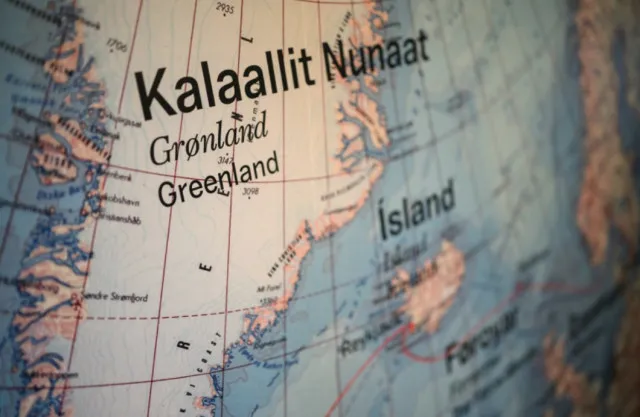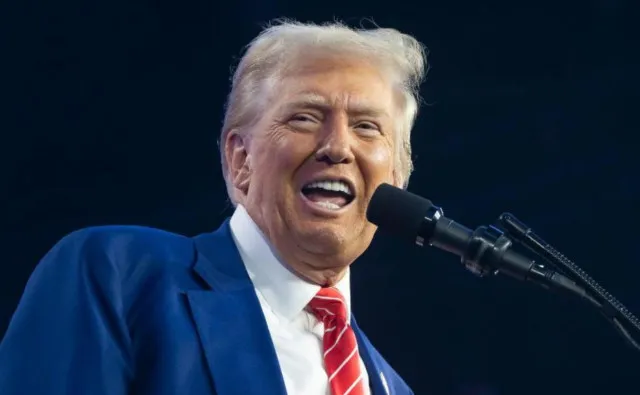Donald Trump’s strong interest in acquiring Greenland raises global concerns as Vladimir Putin issues warning about potential consequences.
Donald Trump has shown a strong interest in acquiring Greenland, a large island located between the Arctic and Atlantic Oceans. His fascination with this territory began during his presidency in 2019.
Recently, he reiterated his desire for Greenland, stating, “we have to have” it. This has raised many questions about his motivations and what it could mean for the island.
Greenland is the world’s largest island and is officially a territory of Denmark. It has a population of about 57,000 people and operates its own government.
Most of the island is covered in ice, which is melting due to climate change. This melting ice is not just an environmental concern; it also reveals the potential for new trade routes and natural resources.

Reason behind Donald Trump’s obsession with taking over Greenland as Putin issues global warning
One of the main reasons Trump is interested in Greenland is its abundant natural resources.
Beneath the ice, there are significant deposits of rare earth minerals, oil, and natural gas. These resources are essential for many industries, including technology and military applications.
The United States could reduce its reliance on imports from countries like China by obtaining access to these materials.
“Greenland is an incredible place,” Trump previously wrote on his Truth Social platform.
“The people will benefit tremendously if, and when, it becomes part of our Nation. We will protect it, cherish it, from a very vicious outside World. MAKE GREENLAND GREAT AGAIN!”
Another factor is the changing geography of the Arctic. As climate change causes the ice to melt, new shipping routes are becoming available.

Greenland could serve as a strategic hub for controlling these routes, which would shorten travel times between major markets. This position could enhance the U.S. influence in global trade.
The interest in Greenland is not just about resources and trade. It also ties into larger geopolitical issues.
Countries like Russia and China are increasing their presence in the Arctic, which poses a challenge to U.S. interests.
By acquiring Greenland, the U.S. could counterbalance these nations’ influences and assert its dominance in the region.
The challenges of acquiring Greenland
Despite Trump’s enthusiasm, acquiring Greenland is not straightforward. Greenland has its own government and a strong sense of identity.
The premier of Greenland, Mute Egede, has made it clear that the island does not want to be part of the United States.
He stated, “We don’t want to be Americans, nor Danes; we are Kalaallit,” emphasizing their desire for self-determination.
“We are not for sale and cannot simply be taken. Our future will be decided by us in Greenland.”

Legally, Denmark cannot simply sell Greenland. According to a rule established in 2009, Greenlanders are recognized as their own people with the right to govern themselves.
This means that any potential acquisition would require significant political changes and negotiations.
The economic context
Greenland’s economy is supported by Denmark, which provides an annual subsidy of around $600 million. The island’s gross domestic product reached over $3.2 billion in 2021.
However, it is worth noting that there is currently no market value assigned to Greenland as a whole, making discussions about its price complex and uncertain.
In the past, the U.S. purchased Alaska for about $7.2 million in 1867, equivalent to roughly $150 million today.
While this historical context provides some perspective, the situation with Greenland is vastly different due to its unique status and the wishes of its people.
Putin issued a warning to Donald Trump
Recently, Russian President Vladimir Putin commented on Trump’s interest in Greenland. He warned that dismissing these ambitions as mere eccentricity would be a grave mistake.
Putin expressed concern about the U.S. plans for Greenland, stating that they have deep historical roots and reflect ongoing geopolitical interests.

“We are talking about serious plans on the American side with regard to Greenland,” he added.
“Those plans have deep historic roots and it is obvious that the US will continue to promote their geopolitical, military and economic interests in the Arctic.
“As for Greenland, I think that this is an issue that concerns two states and has nothing to do with us.
“However, we are concerned by the fact that the NATO countries increasingly identify the far north as a foothold for possible conflicts.”